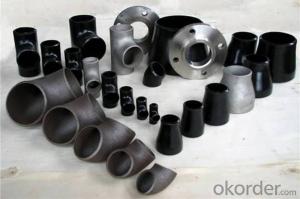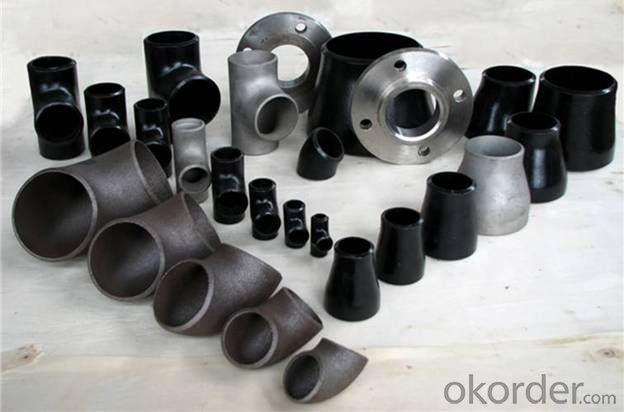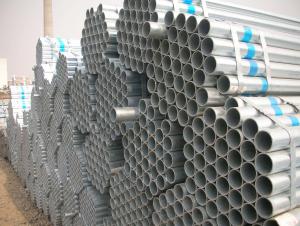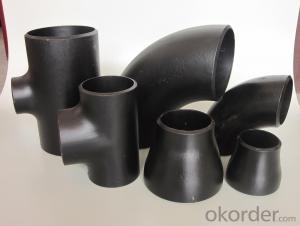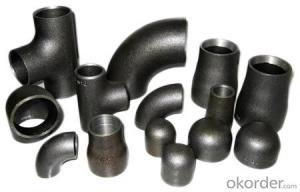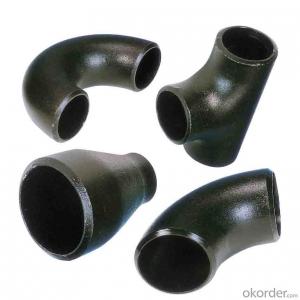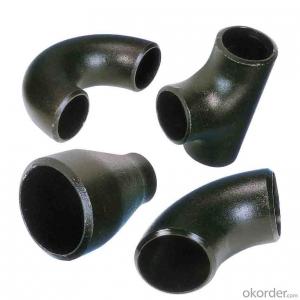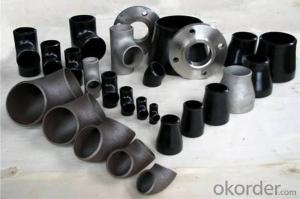22'' ELBOW TEE BEND FLANGE CARBON STEEL FITTINGS
- Loading Port:
- Tianjin
- Payment Terms:
- TT OR LC
- Min Order Qty:
- 5 m.t
- Supply Capability:
- 300 m.t/month
OKorder Service Pledge
OKorder Financial Service
You Might Also Like
Products Detailed Description
Products | pipe fittings elbows, bends,tees, reducers caps |
Size | 1/2" - 48" |
Wall thickness | Sch5-Sch160 XXS |
Standard | ANSI, ASME API5L, OCT, DIN and JIS, etc. |
we can also produce according to drawing and standards provided by customers. | |
Material | Carbon steel, alloy steel and stainless steel. |
We can produce according to materials appointed by consumers. | |
Packaging | Plywood Cases,plywood pallet, plastic bag or as customers requirement |
Surface Treatment | Shot blasted, rust-proof black oil |
Delivery Time | 10-60 days |
Quality | First grade |
Others | 1.Special design available according to your drawing. |
2.anti-corrosion and high-temperature resistant with black painting | |
3. All the production process are made under the ISO9001:2000 strictly. | |
4. A conformity rate of ex-factory inspection of products. |
Specifications
Ansi B16.9 WPB carbon steel pipe fitting elbow tee reducer
Size:Seamless 1/2"-24" Welded 1/2"-48"
ANSI B16.9 WPB carbon steel pipe fitting elbow tee reducer
1.Size: Seamless 1/2"-24" Welded 1/2"-48"
2. WT: SGP, STD, SCH40, SCH80, SCH100,SCH120,SCH160,XS,XXS
3. Material:
stainless steel Grade: 201,304,304L,316,316L,317,317L,904L,and etc
carbon steel Grade: WPB,GRB, Q235,16MN
Alloy steel: st35.8,st52,wp11,wp22,wp12 wp l6
4. Standard: ASTM/AISI/DIN/JIS
5. Type: Concentric and eccentric
6. Surface treatment: Transparent oil, rust-proof black oil
7. Applications range: Applications range: for use in the petroleum, smelting, foodstuff, power, papermaking, chemical, medical equipment,aviation, boiler heat exchanger, and other fields
8. Packing: wooden case or as per customers' requirement
- Q: How do you inspect steel pipes for defects?
- Inspecting steel pipes for defects involves a systematic approach that combines visual inspection, non-destructive testing (NDT) techniques, and specialized equipment. Here are the steps typically followed to inspect steel pipes for defects: 1. Visual Inspection: Start by visually examining the external surface of the pipe, looking for any visible signs of defects such as cracks, dents, or corrosion. Pay close attention to welds, joints, and areas susceptible to stress or damage. 2. Ultrasonic Testing (UT): Ultrasonic testing is commonly used to detect internal defects in steel pipes. It involves using ultrasonic waves that are sent into the pipe and then interpreted based on the echoes received. Any irregularities in the internal structure, like cracks or voids, can be identified and analyzed. 3. Magnetic Particle Inspection (MPI): MPI is a widely used technique to detect surface and near-surface defects such as cracks, seams, or other discontinuities. This method involves applying a magnetic field to the pipe and then applying ferromagnetic particles (usually iron-based) on the surface. These particles will accumulate and form visible indications at the areas of magnetic flux leakage caused by defects. 4. Eddy Current Testing (ECT): Eddy current testing is suitable for detecting surface and near-surface defects in conductive materials like steel. It involves inducing an alternating current into the pipe and monitoring the changes in the electrical currents induced by any defects present. These changes are then analyzed to identify and evaluate the defects. 5. Radiographic Testing (RT): Radiographic testing is performed by exposing the steel pipe to X-rays or gamma rays and capturing the resulting radiographic images. This technique allows for the detection of internal defects such as cracks, porosity, inclusions, or wall thickness variations. The radiographic images are then examined for any indications of defects. 6. Dye Penetrant Inspection (DPI): DPI is a method used to detect surface-breaking defects in steel pipes. It involves applying a liquid dye on the surface, which penetrates into any surface cracks or flaws. After allowing the dye to seep in and adequately react, excess dye is removed, and a developer is applied to draw out the dye from the defects, making them visible. 7. Pressure Testing: Pressure testing involves pressurizing the steel pipe to a predetermined level and monitoring for any pressure drops or leaks. This test ensures that the pipe can withstand the required pressure without any structural defects. It is important to note that the inspection technique used depends on various factors, such as the type of defect being sought, the size and nature of the pipe, and the specific industry standards and regulations. Inspection professionals with expertise in NDT methods and equipment are typically employed to ensure accurate and reliable results.
- Q: How are steel pipes coated for protection against external elements?
- Steel pipes are coated for protection against external elements through a process called pipeline coating. This involves applying a layer of protective material, such as epoxy or polyethylene, onto the surface of the steel pipes. The coating acts as a barrier, preventing corrosion and damage from external factors like moisture, chemicals, and UV radiation. This protective coating ensures the longevity and durability of the steel pipes, even in harsh environments.
- Q: What are the different types of steel pipe coatings for underground applications?
- The different types of steel pipe coatings for underground applications include fusion bonded epoxy (FBE), polyethylene (PE), polyurethane (PU), and coal tar enamel (CTE).
- Q: What is the load-bearing capacity of steel pipes?
- The load-bearing capacity of steel pipes varies depending on factors such as pipe diameter, wall thickness, and the type of steel used. However, steel pipes generally have high load-bearing capacities due to their strength and durability.
- Q: 20# seamless steel pipe and seamless steel pipe 20G what is the difference?
- The difference is: 20# ordinary steel seamless steel pipe. 20G is the type of steel for high pressure boiler tubes.
- Q: Can steel pipes be used for industrial ventilation systems?
- Yes, steel pipes can be used for industrial ventilation systems. Steel pipes are commonly used in such systems due to their durability, resistance to high temperatures, and ability to handle high airflow volumes. They are also cost-effective and can be easily fabricated to meet specific requirements of an industrial ventilation system.
- Q: What are the factors to consider when selecting the right steel pipe for a specific application?
- When selecting the right steel pipe for a specific application, there are several factors to consider. These include the type of fluid or gas that will flow through the pipe, the temperature and pressure conditions of the application, the size and diameter requirements, the level of corrosion resistance needed, the cost and availability of the steel pipe, and any specific industry standards or regulations that must be followed.
- Q: How do steel pipes handle seismic activities?
- Steel pipes are highly durable and resistant to seismic activities. Their strong and flexible nature allows them to withstand the ground shaking during earthquakes without compromising their structural integrity. Steel pipes are designed to absorb and distribute the energy generated by seismic waves, minimizing the potential damage caused by earthquakes. Additionally, their high strength-to-weight ratio makes them ideal for withstanding the lateral forces and ground movements associated with seismic activities.
- Q: What is the fire rating of steel pipes?
- The fire rating of steel pipes can vary depending on factors such as the thickness of the pipe, the type of insulation or fireproofing materials used, and the specific application or building codes. However, steel pipes are generally considered to have good fire resistance properties due to their non-combustible nature and ability to withstand high temperatures.
- Q: How are steel pipes used in sewage systems?
- Steel pipes are commonly used in sewage systems due to their durability and strength. They are used to transport sewage from homes, businesses, and industries to treatment plants or disposal sites. Steel pipes are able to handle the corrosive nature of sewage and are resistant to various chemicals and pressure. Additionally, they are also used for the construction of manholes, pumping stations, and other sewage system infrastructure.
Send your message to us
22'' ELBOW TEE BEND FLANGE CARBON STEEL FITTINGS
- Loading Port:
- Tianjin
- Payment Terms:
- TT OR LC
- Min Order Qty:
- 5 m.t
- Supply Capability:
- 300 m.t/month
OKorder Service Pledge
OKorder Financial Service
Similar products
Hot products
Hot Searches
Related keywords
